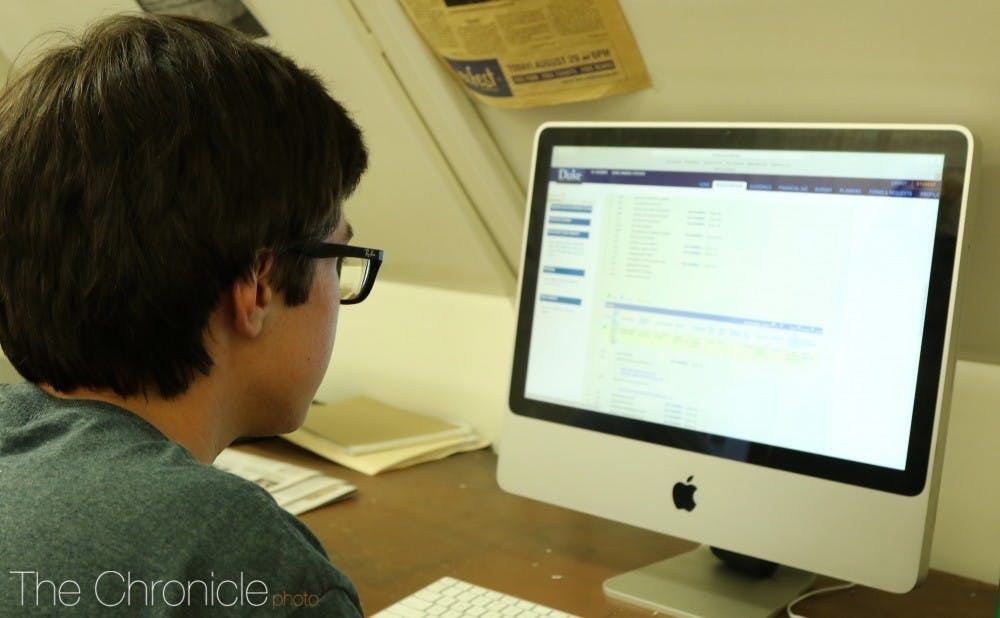One of the most nerve-wracking things about this semester so far is having a bookbag with almost 50 classes and the possibility of not getting into a single one of them. Despite having the last registration window, I bookbagged for the spring semester with reckless abandon. I couldn’t help scouring the course catalog, A to Z, and picking out every class that seems remotely interesting — especially the vast array of arts offerings. Below are some of our favorite offerings across the arts and humanities for the upcoming spring semester.
ARTHIST 225: Gothic Cathedrals
If there’s one thing that stands out about Duke, it’s the outstanding Gothic architecture — specifically the gorgeous Duke Chapel. In this course, students will become acquainted with famous gothic buildings of medieval Europe and learn about their artistic, religious, technological and social significance. This course has two sections, both online, taught by Edward Triplett, instructor of art, art history & visual studies.
AAAS 228S/ENGLISH 379S/LIT382S: Fictions that Mark the Moment
This course studies historical, speculative, postcolonial, experimental, scientific and magical realistic fiction and the ethical frameworks within different novels from important moments in history, as the title of the course suggests. This course is also taught online by Wahneema Lubiano, associate professor of African and African American studies.
DANCE 208S/DOCST 313S/ECON 247S/I&E 310S/MUSIC 310S/PUBPOL 318S/ THEATRST 310: Introduction to Non-Profit Cultural Institutions
A truly interdisciplinary course, “Introduction to Non-Profit Cultural Institutions” educates students on the role of non-profit cultural institutions in the U.S. arts community through regular instruction; in-class, student-led interviews with institutional leaders; cultural experiences, which invite students to explore local cultural venues and participate in arts events; and a service-learning project: working with the Durham Audio Described Art (DADA) project. Experts from Arts Access, a North Carolina organization dedicated to making the arts accessible to those with disabilities, assist students with describing local, public art for the benefit of the visually impaired.
This semester’s service learning project is deeply personal to instructor Daniel Ellison.
“The DADA project is one that, with the assistance of the nonprofit Arts Access, Inc., I helped to develop," Ellison said. "My mother has been blind for the past 12 years, and so the project is inspired, in large part, by wanting to be able to share the arts with my mom.”
Ellison is a Durham attorney who practices arts law. He engages with the local arts community by representing non-profit arts organizations, including helping them achieve tax-exempt status (a topic discussed in the course); serving on councils, committees, and boards, of various arts organizations in the city and beyond; and working directly with artists themselves. He is passionate about arts accessibility — hence the DADA project. In addition to Introduction to Non-Profit Cultural Institutions, he teaches a class called Legal Issues for the Performing Arts (unfortunately, that class will not be offered in the upcoming semester).
Introduction to Non-profit Cultural Institutions is a hybrid course, so on-campus and remote students can participate.
WRITING Courses
For first-years who have not yet completed their Writing 101 requirement, there are plenty of arts-related Writing classes available in the spring. For example, in WRITING 101-43: Beyond Machos and Virgins: Gender and Sexuality in Latin American Film, students examine cinema from Latin America, paying special attention to representations of Latinx sexualities. The three main assignments are a film review geared towards the general public, a more analytical, research-based review, and a final product, the culmination of research on a topic of interest regarding gender and sexuality in the Latin American community.
Another possibility is WRITING 101-33: Writing about Music. In this course students read music criticism and write about musical works. Writing assignments include reflections on musical compositions from an array of genres, a personal essay, and a research paper. At the end of the semester, select student work will be compiled in a zine.
Half-credit courses
Want to make the most of that 4.5 credit limit? Plenty of arts classes are only half-credit courses. For students on campus who are eager for more in-person classes, consider taking a dance course. Elementary, intermediate, and advanced levels of modern, ballet, African, jazz and interdisciplinary dance are all being offered this spring. Additionally, Kundalini Yoga (DANCE 151) will be offered. You can also find a plethora of half-credit music courses on individual instruments or ensembles. One such course is the Duke University Chorale (MUSIC 213-3).
“Singing in the Chorale this fall has filled a deep need that many of our singers find even more meaningful in the midst of the current health crisis,” said director Rodney Wynkoop. Any veteran or wannabe singers (on or off campus) can sign up for an audition and finish the second half of the year as a Chorale member.
Obviously there are way too many amazing arts courses to showcase them all here. Make sure to check out the countless classes in documentary studies, art history, theater studies, dance, music, and more before registration!
Get The Chronicle straight to your inbox
Signup for our weekly newsletter. Cancel at any time.

